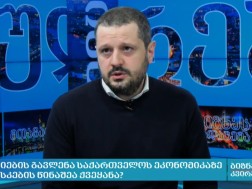PMC Research published a report on Georgian Economic Climate. In a survey of Georgian economists conducted in Q3 of 2023, Georgia’s present economic situation was assessed positively. Their assessment of the present economic situation has improved compared to both – Q2 of 2023 as well as Q3 of 2022.
The surveyed economists’ predictions for Georgia’s economic situation for the next six months are negative. Their expectations in this regard have slightly worsened even compared to the already negative predictions they made in Q2 of 2023 and have significantly worsened compared to the positive expectations recorded in Q3 of 2022.
In addition to assessing the current economic situation and gathering expectations for the next six months, the surveyed experts also made predictions with regard to Georgia’s main economic indicators. According to the results of the survey:
❑ The expected real GDP growth for 2023, on average, is 6.2%. Interestingly, the assessments remained almost unchanged since the previous survey made during the last quarter (Q2 of 2023), when the surveyed economists expected real GDP growth of 6.1% for the year.
❑ The inflation rate (year-on-year) is expected to decrease for the next six months, with the expected rate of inflation for 2023 being 4.2%.
❑ By the end of the next 6 months, compared to the corresponding period of the previous year, the Georgian Lari is expected to be appreciated against the US Dollar, Euro, Russian Rouble and the Turkish Lira.
❑ The volume of exports is expected to increase in the coming six months, compared to the corresponding period of the previous year; and
❑ The volume of imports is also expected to increase in the coming six months, compared to the corresponding period of the previous year.
The surveyed economists were asked to identify which factors they considered to currently pose the greatest threat to the Georgian economy.
❑ A labor shortage was assessed as a very high threat to the Georgian economy by 36% of respondents and as a high threat by 57%. Thus, in total, 93% of the surveyed economists see a labor shortage as a high or very high threat.
❑ Nearly 78% of surveyed economists cited the high emigration rate as a high or very high threat.
❑ Russia’s war on Ukraine was also highlighted as a high or very high threat to the Georgian economy by half of the surveyed economists (50%).
❑ Half of the surveyed economists named rising cost of living as a high or very high threat to the Georgian economy.
❑ Inflationary risks were considered as a low threat or no threat at all by 50% of the surveyed economists.
❑ Nearly one-third (29%) of the respondents assessed exchange rate fluctuations as a low threat.
Against the background of the Turkish Lira falling to a record low, the surveyed economists were asked to assess the impact of that on different aspects of the Georgian economy.
❑ More than three quarters (78%) of the surveyed economists think that the decreasing competitiveness of domestic products against cheaper imports from Turkey will have at least a high impact on the Georgian economy.
❑ Over half (58%) of respondents expect an increase in imports from Turkey to have a high or very high impact.
❑ A decrease in exports from Georgia will have a moderate impact on the Georgian economy according to 57% of the surveyed economists.
❑ A reduction in remittances from Turkey is expected to have a low impact on the Georgian economy by 50% of respondents.
The IMF forecasts global economic growth of 3.5% for 2023, albeit in its July update of the World Economic Outlook certain downside risks
were highlighted. With that in mind, the surveyed economists were asked to identify which downside risks they deemed to pose a threat to the Georgian economy, for which the IMF forecasts growth of 4%.
❑ Nearly two-thirds (64%) of respondents named geoeconomic fragmentation as a high or very high risk factor with respect to Georgia’s economic growth.
❑ Overall, 86% of the surveyed economists think that the decreasing competitiveness of domestic products in relation to cheaper imports from Turkey poses a moderate or high risk.
❑ More than half (57%) of surveyed economists deem increased debt distress as a low risk to Georgia’s economic growth
The surveyed economists were also asked to assess the importance of different factors contributing to economic growth in Georgia.
❑ Tourism was cited by 86% of respondents as a somewhat important or very important contributor to Georgia’s economic growth.
❑ Remittance inflows are considered a somewhat important or very important contributor by 72% of the surveyed economists.
❑ Foreign direct investment (FDI) is classified as a moderately important contributor by 43% of respondents.
❑ Financial services and banking is also deemed at least somewhat important contributor to economic growth according to 71% of the surveyed economists.
❑ Significant proportions of the surveyed economists think that human capital (50%) and technology and innovation (43%) carry only moderate importance. These contributors are deemed not at all important by 21% and 14% of the surveyed economists, respectively.
















